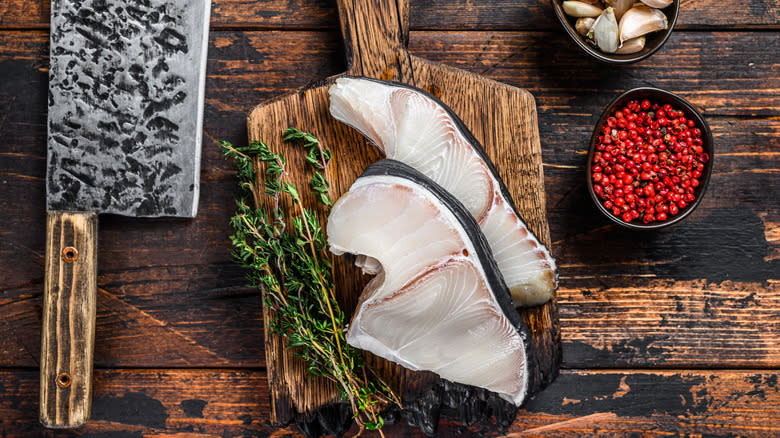Why Marinating Shark Meat Is Absolutely Crucial

With its mild flavor and moist texture, shark meat is highly prized in Scandinavia, India, and Japan. Just like regular fish, it can be fried, baked, seared, or grilled and used in all sorts of recipes. But first, you need to marinate it in saltwater, vinegar, or other liquids to remove its pungent odor. Shark meat has a strong smell due to the presence of ammonia. This odor comes from urea, an organic compound that keeps the shark's skin moist in seawater.
The smell can persist after cooking if the fish hasn't been marinated. Hákarl, or fermented shark, has an even stronger odor due to its high ammonia content. That's the reason Gordon Ramsey couldn't handle this traditional Icelandic dish. Even so, shark meat can taste delicious when cooked properly. You can serve it with green beans or rice, add it to soups and stews, or turn it into sushi.
Read more: 12 Underrated Types Of Fish You Should Try At Least Once
Marinate Shark Meat To Eliminate The Smell Of Ammonia

Humans and most mammals eliminate urea, a by-product of protein metabolism, through urination. Sharks and other fish species retain this compound in their skin and flesh, which prevents them from drying out. The urea in their bodies is converted to ammonia after they die, resulting in a pungent odor. To prevent spoilage, it's essential to bleed and process the catch immediately. However, this step alone may not eliminate the smell of ammonia.
The only way to remove the odor is to brine or marinate the shark meat before consumption. Some chefs will soak it in milk for four or five hours and then cook it as needed. Alternatively, soak it in brine, lime juice, or vinegar and refrigerate it for at least half an hour. The soaking will vary depending on how strong the odor is.
Once cooked, shark meat has a mildly sweet flavor and soft texture. However, it can also be chewy, depending on the preparation method and ingredients used. "I just think they're kind of chewy," said Josh Taylor, a seasoned fisherman, in an interview with USA Today. "Not quite as chewy as an octopus, but definitely close," he added. Eric Myers of Grills Seafood and Tiki Deck at the Port has a different opinion. "The closest thing I can compare it to is alligator and chicken... It's softer than alligator," he told the media outlet.
Think Twice Before Eating Shark Meat

Sharks might be some of the worst fish to eat because of their toxicity. First, they often contain higher levels of mercury than other types of fish and may affect your brain, kidneys, and central nervous system. Some species, such as the hammerhead shark, are deemed unsafe for consumption despite their worldwide popularity.
Another problem is the presence of arsenic, lead, and other heavy metals in shark meat, according to 2021 research published in Chemosphere. These compounds can build up in your tissues and cause severe toxicity. For example, long-term exposure to arsenic may lead to skin, bladder, or lung cancer, diabetes, heart disease, and respiratory problems.
Given these risks, you might want to think twice before cooking shark meat. Salmon, trout, bass, skipjack tuna, and cod are some of the best fish to eat and require minimal prep work. Plus, they're easier on the pocket and more widely available than shark meat. It's also worth mentioning that over 36% of shark and ray species are on the brink of extinction. That's not the case with tuna, salmon, cod, or haddock.
Read the original article on Daily Meal.

